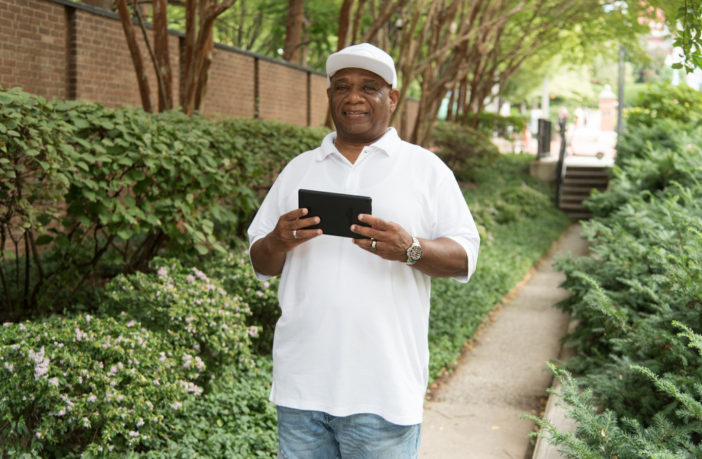
Albert Pannell possessed no digital knowledge before joining Comcast’s Internet Essentials Partnership Program. In working with staff from Johns Hopkins School of Nursing, he learned how to access Zoom and communicate with his relatives. (Courtesy Photo)
By Megan Sayles
AFRO Business Writer
Report for America Corps Member
msayles@afro.com
According to a Pew Research Center study, 51% of adults age 65 and older have high-speed internet at home. For seniors ages 80 and up that number decreases to 28%. For low-income older adults that statistic is even lower.
In an age where people primarily depend on devices and the internet to learn, shop, pay their bills, access medical records and communicate with family and friends, being disconnected can be detrimental to one’s well being.
At one time, 66-year-old Albert Pannell was a victim of disconnectedness and not just in regard to the internet. As a young child, the Baltimore native struggled in school. He did not learn how to read or write until much later in his adult life, and many people in his life overlooked him.
When the world went digital, this trend continued. Pannell had zero knowledge about technology and the internet. Although he owned a cell phone, he wasn’t even totally sure how to operate it. This made communicating with his 12 children and 24 grandchildren extremely difficult.
However, everything changed for Pannell when he was invited to be a part of Comcast’s Internet Essentials Partnership Program while participating in a program at Johns Hopkins.

Albert Pannell possessed no digital knowledge before joining Comcast’s Internet Essentials Partnership Program. In working with staff from Johns Hopkins School of Nursing, he learned how to access Zoom and communicate with his relatives. (Courtesy Photo)
The Internet Essentials Partnership Program, launched in 2020, was created to accelerate internet adoption, especially for low-income populations. It involves public-private partnerships that allow organizations to sponsor the cost of internet service for low-income individuals, and in this case, Johns Hopkins School of Nursing teamed up with Comcast to get older adults connected.
Through this partnership, Pannell was connected with Kelly Gleason, assistant professor at Johns Hopkins School of Nursing. Gleason led the charge in providing older adults, including Pannell, with digital skills training.
This comprised teaching them how to access email, Zoom and wireless connection for their device. She also had them pick a personal learning goal to encourage them to use their devices more frequently.
While participating in the Internet Essentials Partnership Program, Pannell received a free tablet and learned how to use Zoom and access movies and scripture.
“When you’re living alone that tablet can help you with a lot of stuff,” said Pannell. According to him, the experience was life-saving.
In an effort to inform more seniors about the program, Pannell even began promoting it at his church and demonstrating how to use his tablet for members of his congregation. He also intends to use his new digital skills to enroll in the South Baltimore Learning Center’s GED Program.

Wanda Dudley is a Washington D.C. resident who became well-versed in the latest technology through her career, acknowledges the challenges that her senior peers face. (Courtesy Photo)
In part, the reason older adults are less likely to use technology and the internet is because of their fear. Pannell, himself, admitted that when the tablet was put in front of him he was scared, but he encouraged other seniors to at least give it a try.
Much like Pannell, senior Wanda Dudley also recognized the hesitancy and fear that surrounds internet adoption for older adults. The D.C. resident had various careers that made her well-versed in using technology, but she witnessed a lot of reluctance from her peers.
“Some seniors are not computer literate and are afraid to learn something new,” said Dudley.
As a result, she became an advocate for the United Planning Organization’s (UPO) digital skills pilot training program.
UPO, a community action agency for D.C., has been a long-time community partner of Comcast and constantly voices its support for the Internet Essentials Program.
Dudley influenced dozens of older adults to sign up for the organization’s digital skills training where they learned how to create and send emails, access the internet, download files and use search engines and teleconferencing programs.
“Many seniors have low incomes and are worried about paying their bills,” said Dudley “Some didn’t even realize that sending an email is free. Overall, the experience was pretty good for the seniors who participated in the program.”
Help us Continue to tell OUR Story and join the AFRO family as a member – subscribers are now members! Join here!



